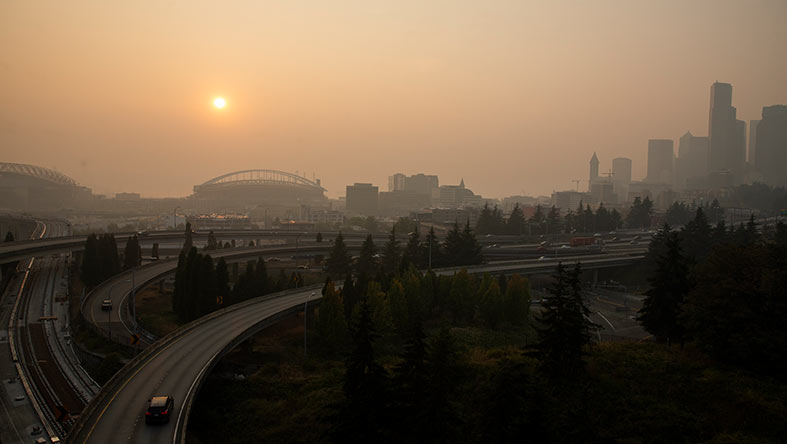Each summer brings the increased risk of wildfire to Washington, and with it, unhealthy air.
Poor air quality can irritate and damage lungs, especially for people who have congestive heart failure, chronic obstruction pulmonary disease (COPD), asthma, and other heart or breathing conditions. Exposure can also cause a fast heart rate, chest pain, trouble breathing, and asthma attacks.
People with heart or respiratory conditions, children, and the elderly are most at risk for poor air quality from wildfire smoke. However, smoky air can affect you even if you’re not in a high-risk group, causing sore throat, headaches, runny nose, and fatigue.
Here are some steps you can take to stay healthy when the air quality is low. Don’t hesitate to talk to your doctor if you have questions or concerns!
- Check your local air quality reports. Find out the latest forecasts and monitors at the Washington Smoke Information Blog, or for a county-by-county breakdown, visit the Washington State Department of Ecology. Checking air quality daily will help you decide what level of activities you can complete outside.
- Shut windows and doors to keep out poor-quality air. This will help keep the air in your home as clean as possible and keep pollutants from smoky air from coming inside.
- Turn air conditioners on recirculate. This will help keep the bad air outside your home.
- Keep in-home air clean. Vacuum the house. Don’t burn candles and don’t use the fireplace.
- Use a freestanding indoor air filter that can remove harmful particles. You can also make a DIY version from a box fan and duct tape.
- Avoid outdoor exercise. If the air quality is unhealthy, you might also want to limit exercise or strenuous activity inside.
- The right mask and proper fit can reduce your exposure to wildfire smoke. Face coverings protect against COVID-19 but cloth and surgical masks don’t provide much protection from wildfire smoke. N95 respirators and KN95 masks offer good protection. If you have a pre-existing condition that might make you more sensitive to smoke, consult your medical provider.
- Call 911 if you see a nearby fire or smell smoke. Don’t call 911 if you only see smoke in the distance. Often wildfire smoke in Washington comes from other states or Canada.

Make sure you have your medications refilled and have a plan for protecting yourself if the air quality gets bad. If you have questions about your medications or need a refill, contact your doctor or pharmacy. Community Health Plan of Washington cares about your health!
Learn More
- See what the smoke map from the Washington Smoke blog, a partnership between state, county, and federal agencies, and Indian Tribes.
- Make a DIY of indoor air filter version from a box fan and duct tape.
- Protect yourself from wildfire Smoke from the CDC.

